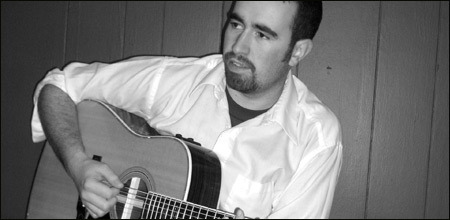
EMBRACING DUALITY DeMelo. |
He’s a romantic, that’s for sure, but he’s also a realist. It’s that duality that has made Craig DeMelo the kind of artist he is. The New Bedford native is an honest songwriter who’s loopy about love and all its trappings.
Backing up, the story goes something like this: as a freshman in college, DeMelo picked up on blues-rock heavyweights like Hendrix and Stevie Ray. He formed and fronted a band called Lemonstone that began carving inroads in the Boston area, but before that band could see it through, they broke up. And that’s when DeMelo started taking a special interest in the singer-songwriter dudes: Dylan, Cat Stevens, James Taylor, and Paul Simon. He embraced concepts like intimacy, sincerity, and honesty, and gave his guitar a rest. Well, when you intersect those two idioms, you get a talent like DeMelo: he has the sensibility of a singer-songwriter with the added flavor and funk of good blues ’n’ rhythm. Rather than whipping out a coffer of sizzling licks, he focused on delivering songs that made people feel like he did when he feasted on the brilliant work of his favorite writers.
Six years later, the self-described Whiskey Poet has been around the Northeast block a few times, opening for national acts like Howie Day and selling quite a few CDs in the process. On his debut album, also titled The Whiskey Poet, the release of which will be celebrated on Friday, February 23 at Harper’s Ferry in Allston, Massachusetts, he’s crisp, accessible, and invigorated. DeMelo’s voice is sweet and likable, with clear, literate lyrics that are tailor-made for AOR radio. Songs such as “So Be It” and “Hit the Ground” are sensitive and songwritery, while “Johnny Blue” and “Let’s Talk Money” boast the subtle and soulful blues flavor of his early artisthood. The fact is, both the yin and the yang sides are pretty damn good and, if all falls into place, DeMelo has the prospect of growing into a major pop-type artist. As far as we’re concerned, a future beckons.
Jerimoth Hill
In the aging, cotton-print skirt and leather-vest world of New England folk music, Atwater-Donnelly has created a kind of demi-legend. They’ve dominated the local scene for decades with their unique take on traditional acoustic roots music, exposing audiences to vintage folios of historically accurate sounds the likes of which would virtually disappear were it not for their flame-keeping. If the buck stopped today for whatever reason, Aubrey and Elwood’s place in local lore is secure. But, with the exception of a few stalwarts, traditional New England folk music would become an endangered species.
Lucky for us, A-D remains steadfast. But these days they’ve added a twist. The duo, along with Cathy Clasper-Torch, John and Heidi Cerrigione, and Uriah Donnelly, the youngest son of the founding duo, have formed a gospel outfit called Jerimoth Hill. Named for the highest point in our state and A-D’s place of residence, Jerimoth Hill has long been a dream for Elwood. Much of the couple’s folk material glances off the spiritual, but they’ve never gone for it wholeheartedly. That’s changed with Jerimoth Hill’s debut, The Halfway Ground.
Similar to the work of their main gig, the material on The Halfway Ground comes as a result of years of research. Elwood scoured the back roads and alleys of American traditional gospel to craft material that reflects a time when music played a significant role in day-to-day life. The Halfway Ground hearkens back to a time when hope and struggle, God and the land, peace and faith all co-existed in the hearts and minds of regular folk.
The polished production really exults in the group’s gorgeous five-part harmonies. Jerimoth Hill will undoubtedly be a treat for A-D’s many fans, but it will also exhilarate those who have longed to hear fresh new sounds.